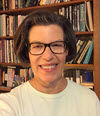You’re on Facebook and Twitter, of course, but are you making the most of each platform? What about Instagram and LinkedIn?

Tracy Davidson, morning anchor at WCAU-TV in Philadelphia, is on all of the above, early and often. “I start at 1:15 [a.m.] when I wake up,” she told the 2018 Excellence in Journalism conference in Baltimore.
Davidson and Chip Mahaney, news director at WCPO-TV in Cincinnati, shared their best tips for searching and sharing on social media.
- Get on Next Door. “It’s Facebook without having to be friends,” Mahaney said, “and low hanging fruit for stories.” Every member of the WCAU morning staff is on the Next Door site for the neighborhood where each of them lives. “Be a good neighbor on there,” Davidson advised. She always identifies herself and asks if she can contact posters about stories. “I don’t want to get kicked out,” she said.
- Create Facebook groups. Mahaney suggested creating open groups on topics people care about, like high school sports or big news stories. “If you have a good group it will show up on people’s feeds,” Mahaney said. Be active in the group and set the tone for the conversation. Pin your terms of service at the top of the page and hold people accountable. “I’m the ultimate judge,” Mahaney said. “If I think you were abusive, I will strike your post right away. As long as you don’t edit posts, there’s no legal backlash.”
- Be consistent on Twitter. Post every day and keep your feed focused on what you know best. “Reliability is part of your brand,” Mahaney said. “Be personable and professional.”
- Share more on Instagram. Davidson shares some personal stuff on Instagram, not just news, but still nothing she considers private. “I let people know a little bit about myself,” she said. But she advises journalists to be careful about what they post. “What’s OK for the family may not be OK [on your public Instagram feed].” For example, there are ways to do a beach picture that won’t hurt your credibility. Whatever you do, “Make your pictures beautiful.”
- Do more on LinkedIn. Don’t just post your resume, Mahaney said. Describe your work and accomplishments. What did you do? What difference did you make? Use a professional-looking headshot and look friendly. Use keywords so your profile will show up in searches. “Be descriptive. Tell a great story,” Mahaney said. “There’s no penalty for being too long.” Davidson also uses LinkedIn for journalism, finding stories and sources there.
How can you improve your use of social media? Try these suggestions:
- Set a goal. Work on one platform at a time and watch your numbers. Likes, comments, shares, views, read more clicks: all of them matter.
- Challenge others. Be the best in your newsroom at social media engagement. At Davidson’s station, the morning crew competes with the evening crew.
- Be great somewhere. “Excellence on one platform is better than irrelevance on several,” Mahaney says.
- Multiply your influence. Who are the [social] stars in your community? Where can you meet them? Retweet them and they might retweet you.
“Be the one that shines the light,” Mahaney said. “Be ‘here to serve.’ People will respond.”
This post originally appeared on advancingthestory.com.

Deborah Potter is an experienced journalism trainer and reporter who spent 16 years as a network correspondent at CBS News and CNN. She is co-author of “Advancing the Story: Quality Journalism in a Digital World,” now in its fourth edition. She writes regularly about journalism on the Advancing the Story website. For almost 20 years, Deborah ran NewsLab, the journalism site she founded in 1998, which is now part of the University of Mississippi. Deborah leads workshops for journalists in newsrooms across the United States and around the world on writing, social media, digital journalism and ethics.








